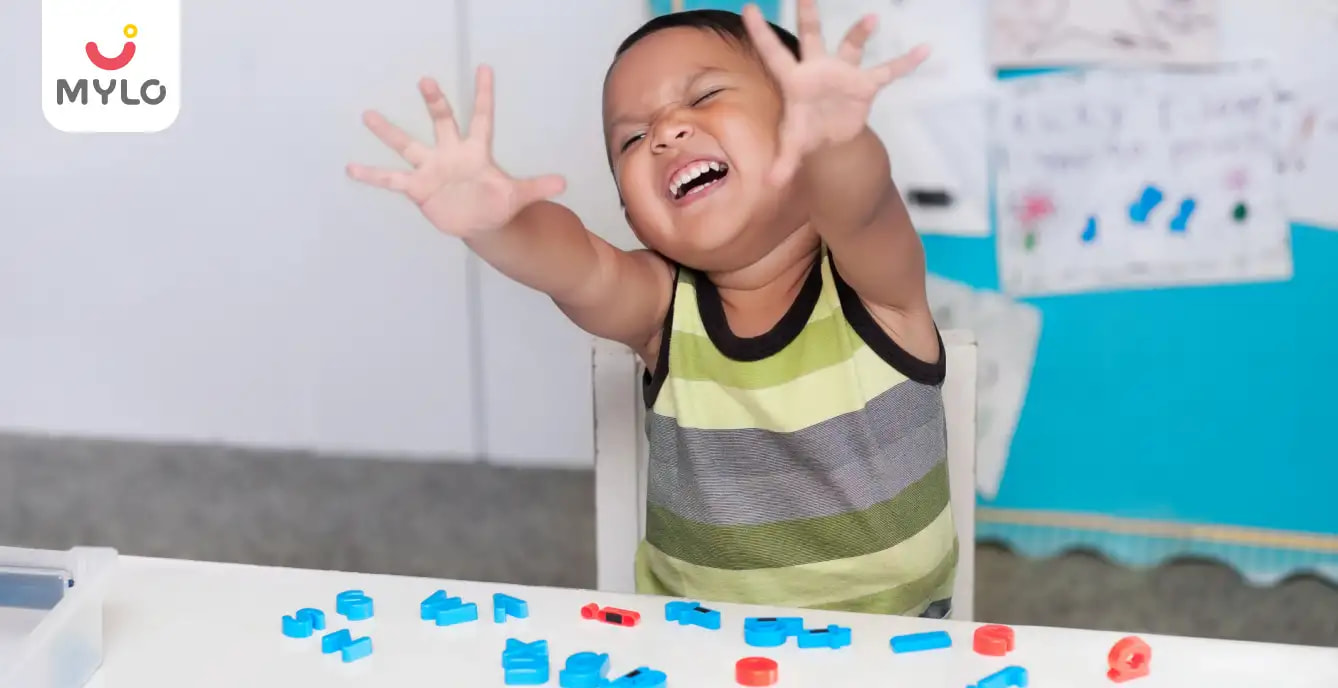- Home

- Developmental Disorders

- Management of Developmental Disorders in Toddlers
In this Article
Developmental Disorders
Management of Developmental Disorders in Toddlers
Updated on 3 November 2023
Developmental disorders are brain-based or physical conditions that may affect your child’s progress while they are developing and growing. Developmental disorders affect each child differently. One may experience mild impairment, whereas another may require constant assistance in performing everyday tasks. However, living with childhood developmental disorders doesn’t mean your child will have no quality of life. Children can continue to live happy and full lives even with developmental challenges.
Development delays in children may impact different areas of their lives, such as:
-
Social skills
-
Cognitive skills
-
Mobility
-
Language skills
-
Biological functions
-
Emotional and physical independence
What are the most common developmental disorders in toddlers?
Here is a list of developmental disorders that may affect babies and toddlers during childhood.
1. Learning disorders:
Three different learning disorders can affect your child’s ability to process information. Learning disorders result in academic weak spots, but that doesn’t mean your child will not be intelligent. A child with a learning disorder may face problems distinguishing right from left or may reverse letters while reading. Some kids may also face challenges with writing skills and math. Common learning disorders include dyslexia, dyscalculia, and dysgraphia.
2. Autism Spectrum Disorder:
This neurodevelopmental disorder affects your toddler’s communication, behaviour, social, and sensory skills. Some children may face learning difficulties, whereas many children with autism are gifted.
3. Language Disorders:
If your child is experiencing issues in communicating, it may be caused due to a language disorder. It can lead to symptoms such as stammering, stuttering, inability to express or understand words, delayed speech, and difficulty making sentences.
4. ADHD:
ADHD is often incorrectly diagnosed as a learning disorder. A child with ADHD exhibits symptoms such as hyperactivity, difficulty focusing, and challenges in the learning environment.
5. Fetal Alcohol Spectrum Disorder:
One of the most common causes of developmental disorders is when a pregnant mother consumes alcohol while carrying a child. Commonly called FASDs, the condition may lead to numerous side effects such as low fetal body weight, hearing and vision problems, non-typical facial features, executive functioning challenges, and cognitive difficulties.
6. Intellectual disorders:
A child diagnosed with a lower capacity for learning, applying skills, and reasoning is said to be living with an intellectual disorder. Low IQ can reflect in day-to-day tasks as well. A child may also have an intellectual disorder due to other developmental disorders like fetal alcohol syndrome.
7. Physical Developmental Disorders:
Developmental disorders may also present themselves as a physical challenge. Your child may require a wheelchair or have something less apparent, like a change in brain structure. Common physical developmental disorders include spina bifida, cerebral palsy, and muscular dystrophy.
How is developmental disorder treated?
Most childhood developmental disorders can be treated and managed efficiently for life. Medication, therapy, and daily assistance will depend on the particular disorder your child has and how it has impacted their daily functioning. If you believe your child is showing any signs of a developmental delay in children, get in touch with your healthcare professional. Early diagnosis and timely intervention are vital to making a difference and keeping your child on a continuous developmental trajectory.
Baseline child developmental models and physical assessment will help you understand how your child’s progress compares to the other children in the same age group. However, whatever the case, management of developmental disorders for toddlers is always possible.
You may also like: A New Parent's Guide to Baby Language Skills
How to help a child with developmental delay?
Each child with developmental delay has unique strengths. They may have a particular inclination towards doing artwork, in their motor skills, or their personality. It is important to focus on what they love to do and can do instead of focusing on things they cannot. In fact, we can help children use their abilities to assist in the areas in which they are weaker.
Few kids with disabilities face problems in speaking and forming sentences. However, even without speaking, they can communicate with others. When a baby is born, they communicate without speaking. You can understand their likes and dislikes through gestures, smiles, or crying. Similarly, children who cannot speak properly can also communicate with non-verbal gestures such as smiling or making an upset face. Parents need to understand their child’s non-verbal cues to communicate with them effectively.
Children get stimulated by their environment and everything around them. If your child is living with developmental disorder, you must spend some time talking to them, using simple language to make them understand what you are doing, smiling with them, and making noises around them so they can respond.
Involve your child in daily activities, such as housework or moving around. You can also stimulate them by playing with them, making toys at home, putting stones in a bottle and using it as a rattle, or waving different coloured ribbons in front of them. Simple activities around the house will keep your child engaged and happy.
References
1. Vasudevan P, Suri M.(2017). A clinical approach to developmental delay and intellectual disability.
2. Choo YY, Agarwal P, How CH, Yeleswarapu SP. (2019). Developmental delay: identification and management at primary care level.



Written by
Parul Sachdeva
A globetrotter and a blogger by passion, Parul loves writing content. She has done M.Phil. in Journalism and Mass Communication and worked for more than 25 clients across Globe with a 100% job success rate. She has been associated with websites pertaining to parenting, travel, food, health & fitness and has also created SEO rich content for a variety of topics.
Read MoreGet baby's diet chart, and growth tips

Related Articles
How Respiratory Syncytial Virus (RSV) Impacts Premature Babies Differently: What Every Parent Needs To Know
Adverbs: A Comprehensive Guide to help small children learn the usage of adverbs
Expand Your Child's Vocabulary with words that start with X: Easy, Positive, and Engaging Words, Animals, Countries, and Fruits
Unlocking Language Proficiency: The Ultimate Guide to Top 100 Sight Words for Kindergarten and Beyond
Related Questions
Influenza and boostrix injection kisiko laga hai kya 8 month pregnancy me and q lagta hai ye plz reply me

Hai.... My last period was in feb 24. I tested in 40 th day morning 3:30 .. That is faint line .. I conculed mylo thz app also.... And I asked tha dr wait for 3 to 5 days ... Im also waiting ... Then I test today 4:15 test is sooooo faint ... And I feel in ma body no pregnancy symptoms. What can I do .

Baby kicks KB Marta hai Plz tell mi

PCOD kya hota hai

How to detect pcos

Related Topics
RECENTLY PUBLISHED ARTICLES
our most recent articles

Diet & Nutrition
গর্ভাবস্থায় আলুবোখরা: উপকারিতা ও ঝুঁকি | Prunes During Pregnancy: Benefits & Risks in Bengali

Diet & Nutrition
গর্ভাবস্থায় হিং | ঝুঁকি, সুবিধা এবং অন্যান্য চিকিৎসা | Hing During Pregnancy | Risks, Benefits & Other Treatments in Bengali

Women Specific Issues
স্তনের উপর সাদা দাগ: লক্ষণ, কারণ এবং চিকিৎসা | White Spots on Nipple: Causes, Symptoms, and Treatments in Bengali

Diet & Nutrition
গর্ভাবস্থায় পোহা: উপকারিতা, ধরণ এবং রেসিপি | Poha During Pregnancy: Benefits, Types & Recipes in Bengali

Diet & Nutrition
গর্ভাবস্থায় মাছ: উপকারিতা এবং ঝুঁকি | Fish In Pregnancy: Benefits and Risks in Bengali

Diet & Nutrition
গর্ভাবস্থায় রেড ওয়াইন: পার্শ্ব প্রতিক্রিয়া এবং নির্দেশিকা | Red Wine During Pregnancy: Side Effects & Guidelines in Bengali
- ইনার থাই চ্যাফিং: কারণ, উপসর্গ এবং চিকিৎসা | Inner Thigh Chafing: Causes, Symptoms & Treatment in Bengali
- গর্ভাবস্থায় ব্রাউন রাইস: উপকারিতা ও সতর্কতা | Brown Rice During Pregnancy: Benefits & Precautions in Bengali
- Velamentous Cord Insertion - Precautions, Results & Safety
- Unlock the Secret to Flawless Skin: 7 Must-Have Qualities in a Face Serum
- Unlock the Secret to Radiant Skin: How Vitamin C Serum Can Transform Your Complexion
- Gender No Bar: 10 Reasons Why Everyone Needs a Body Lotion
- Unlock the Secret to Radiant Skin How to Choose the Perfect Body Lotion for Your Skin Type
- Top 10 Reasons to Apply a Body Lotion After Every Bath
- Communication in Toddlers: Milestones & Activities
- How to Improve Vocabulary for Toddlers?
- A Comprehensive Guide to Understanding Placenta Accreta
- Vulvovaginitis in Toddlers Causes, Symptoms and Treatment
- A Comprehensive Guide to Understanding Cerebral Palsy in Children
- Bitter Taste in Mouth During Pregnancy: Understanding the Causes and Remedies


AWARDS AND RECOGNITION
Mylo wins Forbes D2C Disruptor award
Mylo wins The Economic Times Promising Brands 2022
AS SEEN IN
















At Mylo, we help young parents raise happy and healthy families with our innovative new-age solutions:
- Mylo Care: Effective and science-backed personal care and wellness solutions for a joyful you.
- Mylo Baby: Science-backed, gentle and effective personal care & hygiene range for your little one.
- Mylo Community: Trusted and empathetic community of 10mn+ parents and experts.
Product Categories
baby carrier | baby soap | baby wipes | stretch marks cream | baby cream | baby shampoo | baby massage oil | baby hair oil | stretch marks oil | baby body wash | baby powder | baby lotion | diaper rash cream | newborn diapers | teether | baby kajal | baby diapers | cloth diapers |





